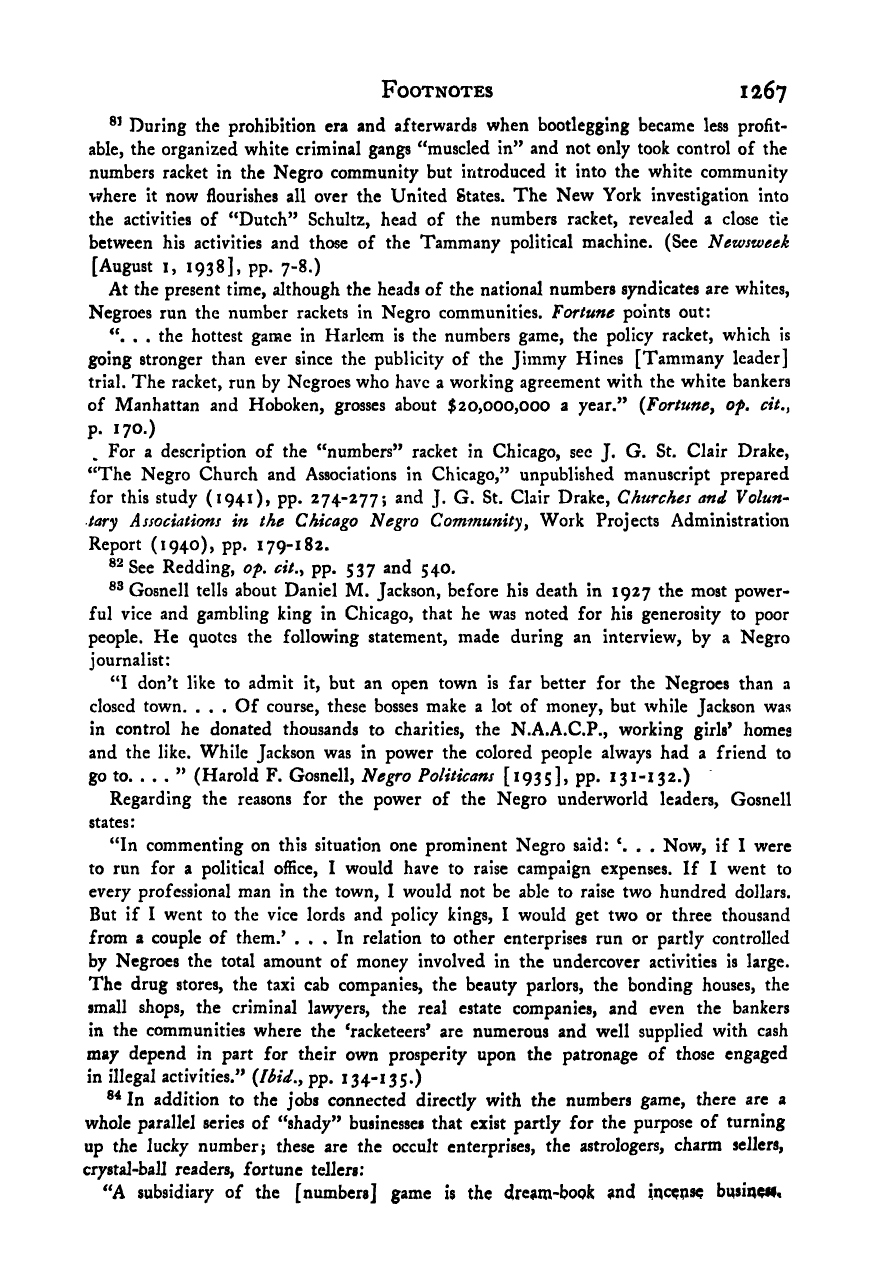Note: Gunnar Myrdal died in 1987, less than 70 years ago. Therefore, this work is protected by copyright, restricting your legal rights to reproduce it. However, you are welcome to view it on screen, as you do now. Read more about copyright.
Full resolution (TIFF) - On this page / på denna sida - Footnotes - Chapter 14

<< prev. page << föreg. sida << >> nästa sida >> next page >>
Below is the raw OCR text
from the above scanned image.
Do you see an error? Proofread the page now!
Här nedan syns maskintolkade texten från faksimilbilden ovan.
Ser du något fel? Korrekturläs sidan nu!
This page has never been proofread. / Denna sida har aldrig korrekturlästs.
Footnotes 1267
During the prohibition era and afterwards when bootlegging became less profit-
able, the organized white criminal gangs ‘‘muscled in” and not only took control of the
numbers racket in the Negro community but introduced it into the white community
where it now flourishes all over the United States. The New York investigation into
the activities of “Dutch” Schultz, head of the numbers racket, revealed a close tie
between his activities and those of the Tammany political machine. (See Newsweek
[August I, 1938], pp. 7-8.)
At the present time, although the heads of the national numbers syndicates are whites,
Negroes run the number rackets in Negro communities. Fortune points out:
. . the hottest game in Harlem is the numbers game, the policy racket, which is
going stronger than ever since the publicity of the Jimmy Hines [Tammany leader]
trial. The racket, run by Negroes who have a working agreement with the white bankers
of Manhattan and Hoboken, grosses about $20,000,000 a year.” (Fortuney of, cit,^
p. 170.)
For a description of the “numbers” racket in Chicago, sec J. G. St. Clair Drake,
“The Negro Church and Associations in Chicago,” unpublished manuscript prepared
for this study (1941), pp. 274-277; and J. G. St. Clair Drake, Churches and Volun*
tary Associations in the Chicago Negro Community Work Projects Administration
Report (1940), pp. 179-182.
See Redding, of, cit.y pp. 537 and 540.
Gosnell tells about Daniel M. Jackson, before his death in 1927 the most power-
ful vice and gambling king in Chicago, that he was noted for his generosity to poor
people. He quotes the following statement, made during an interview, by a Negro
journalist:
“1 don’t like to admit it, but an open town is far better for the Negroes than a
closed town. . . . Of course, these bosses make a lot of money, but while Jackson was
in control he donated thousands to charities, the N.A.A.C.P., working girls’ homes
and the like. While Jackson was in power the colored people always had a friend to
go to. . . . ” (Harold F. Gosnell, Negro Politicans [1935], pp. 131-132.)
Regarding the reasons for the power of the Negro underworld leaders, Gosnell
states:
“In commenting on this situation one prominent Negro said: ‘. , . Now, if I were
to run for a political office, I would have to raise campaign expenses. If I went to
every professional man in the town, I would not be able to raise two hundred dollars.
But if I went to the vice lords and policy kings, I would get two or three thousand
from a couple of them.’ ... In relation to other enterprises run or partly controlled
by Negroes the total amount of money involved in the undercover activities Is large.
The drug stores, the taxi cab companies, the beauty parlors, the bonding houses, the
small shops, the criminal lawyers, the real estate companies, and even the bankers
in the communities where the ‘racketeers’ are numerous and well supplied with cash
may depend in part for their own prosperity upon the patronage of those engaged
in illegal activities.” {Ibid,, pp. 1 34-1 35.)
In addition to the jobs connected directly with the numbers game, there are a
whole parallel series of “shady” businesses that exist partly for the purpose of turning
up the lucky number; these are the occult enterprises, the astrologers, charm sellers,
crystal-ball readers, fortune tellers;
“A subsidiary of the [numbers] game is the dream-book and inc^nso bqsinw.
<< prev. page << föreg. sida << >> nästa sida >> next page >>